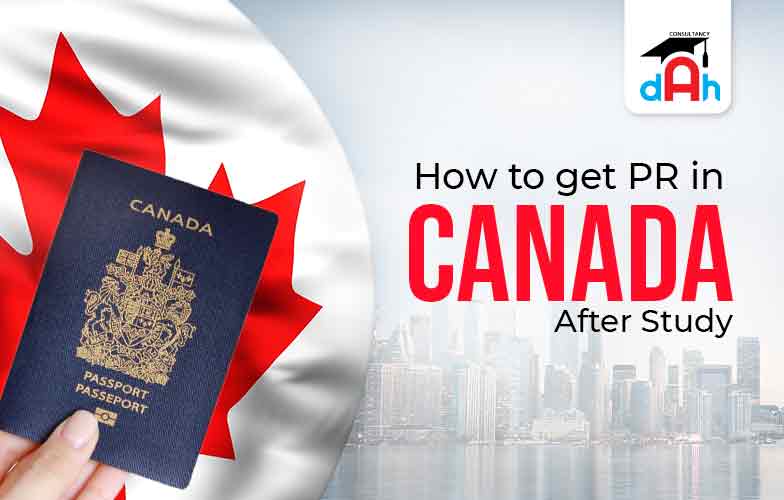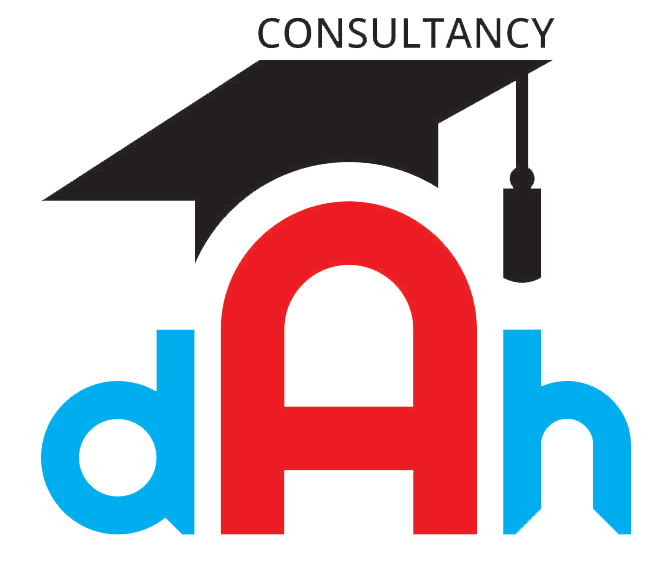How to get PR in Canada after Study

Any international students planning to or actually studying in Canada might have stumbled upon this thought. So, how to get PR in Canada after study as a Nepalese Students? Can you even do that?
Well, a very short answer to that is yes. And even though many students make their way into Canada, they’re not aware of how easy it is to get PR for Nepalese Students in Canada.
The big bulky responsibility to pursue your dream to study in Canada from Nepal is actually overwhelming. Canada has provided students with the opportunity to get PR upon fulfilling various criteria.
So, utilizing those to your full advantage is something that will only further secure your future in Canada from Nepal. This guide covers everything you need to know about acquiring PR in Canada. Before that, let’s figure out what a Canada PR visa truly is and what perks does it have.
What is a Canada PR visa?
A Canadian PR visa is a valid permit that allows you to work and settle in Canada. Therefore, any individual with a Canada PR visa can live in Canada legally. However, they are not considered native citizens of Canada. They are provided the permanent resident status by the government of Canada.
Prior to kickstarting your process of PR in Canada, it is important to be aware of Canada’s PR requirements. International students can apply for PR through immigration programs depending on education, skills, and work experience. For this, you need to submit an application to Immigration, Refugees, and Citizenship Canada (IRCC).
Advantages of getting PR for International Students in Canada
Everybody might give you two cents as to why pr for international students in Canada can open the door to countless opportunities. But this equally stays true even when you make your way into Canada as an international student.
The access to a Canada PR visa is certainly the cherry on the cake. Some of the advantages of PR for international students in Canada include:
1. Live and work in Canada
The major benefit of a Canada PR visa is that you get to live and work in Canada. After attaining PR, you have the freedom to visit any part of Canada. You are not obliged to stick with an employer or a job or even a province.
The best part about it is after completing five years of stay in Canada; you will be eligible to apply for Canadian Citizenship with your permanent residency status. So, you see there’s a win-win situation.
2. Extend or Renew your Visa
A Canada PR visa is the ultimate gateway to security. Unlike other complicated processes across the international countries, Canada allows its resident to extend their visa status for an unlimited time.
So, the expiry period of 5 years doesn’t really act as any restriction. You don’t have to worry about getting kicked out after spending some substantial years and can actually renew your permit by following all the guidelines. This further reinforces the benefits of staying in Canada.
To top it off, you can also apply for Canadian citizenship once you’ve physically lived in the country for 1,095 days (three years) out of the five during your permanent resident days.
3. Open Pathway for your family
Everyone looks for ways to provide security to their family. This definitely holds true in the context of winning over the Canada PR process after study in Canada. You are allowed to bring your family members once you fulfill Canada PR requirements and make your way as a permanent resident.
If you are over 18 years of age, you can even sponsor some residents upon fulfilling the criteria.
Process of PR in Canada
Now that you’ve understood the significance of Canadian PR status, let’s take a look into the process of PR in Canada. Canada’s PR process is actually varied. This means people can try different possible ways as per their current standing and mentioned Canada PR requirements.
Given below are some of the processes of PR in Canada:
1. Canadian Experience Class
The Canadian Experience Class (CEC) program is run under the Express Entry immigration system. It is also one of the quickest methods to get permanent residence in Canada. There are several factors that determine your eligibility for this program such as age, language proficiency, and level of education.
Applicants must demonstrate that they have completed at least 12-months of continuous, full-time, skilled work experience in Canada within the previous three years, or an equivalent amount of part-time experience.
CEC can be a wonderful immigration option for an international student who has gained a certain level of job experience.
Work experience earned during a period of full-time study does not count towards the 12-month requirement. So, international students cannot use work experience gained during their studies to meet the CEC requirement.
2. Federal Skilled Worker Program
The Federal Skilled Worker (FSW) program is also run under the Express Entry immigration system. So, this may be a great option for some international student graduates. FSW does not require Canadian work experience, unlike the Canadian Experience Class (CEC). Hence it is a viable alternative for international student graduates who have already earned competent work experience elsewhere.
The FSW program is a merit-based immigration program that uses a points-based Comprehensive Ranking System (CRS) score to evaluate candidates against one another, with only the most competitive profiles being invited to apply for permanent residency.
If you’re an international student who fulfills the eligibility for PR standards and has a pretty competitive profile in the CRS score system, then FSW can be a wonderful avenue to become a permanent residency.
3. Provincial Nominee Programs
Provincial Nominee Programs are immigration programs run by each of Canada’s provinces and territories (PNPs). The PNP programs work differently as per certain provinces or territories. Many PNPs give preference to applicants who have an association with the province, such as past study or job experience in the province.
An international student may be eligible to apply for a PNP in the province where they completed their program of study, depending on the province where they completed their program of study.
4. Post-Graduation Work Permits
A Post-Graduation Work visa is actually an indirect path to permanent residency. Most international students who have graduated from a designated learning institution (DLI) are allowed to stay in Canada following their studies and work for any employer in the country.
This experience can help a person qualify for permanent residency in Canada, usually through the Canadian Experience Class (CEC) or a Provincial Nominee Program sponsored by an employer (PNP).
5. Quebec Immigration Options
Quebec has its own set of rules when it comes to the immigration system with different standards and procedures from those in the rest of the country. However, Quebec’s Immigration policies, like those in the rest of Canada, are structured in such a way that international students enjoy an advantage when seeking permanent residence.
The two main permanent residence programs in Quebec feature streams specifically targeted for overseas students:
Quebec Experience Program
In order to qualify for this program, students must have finished their program of study or be within 6 months of completing their studies at a Quebec university. International students are also required to exhibit advanced intermediate oral French proficiency.
Quebec Skilled Worker
International students in Quebec who have completed or are in the process of finishing an educational credential in Quebec are the perfect fit for the Quebec Skilled Worker (QSW) program.
Unlike the PEQ program, QSW does not require candidates to have a minimum level of French proficiency, but they must get a minimum score on the program’s points evaluation grid.
Canada PR requirements | Eligibility Criteria for Canada PR visa
So, you see the process of PR in Canada is really not difficult and can be cracked by understanding the Canada PR requirements. You should be aware that PR processes in Canada are different due to the applicant’s choice of immigration pathway. Consequently, Canada PR requirements also vary as per the applicant’s selection of program.
The essential eligibility criteria for a Canada PR visa include:
- Proof of adequate funds to support your application and stay in Canada
- Educational Credential Assessment(ECA)
- Original Copy and official translation of paperwork to support your visa application
- Language test score
- Necessary Educational Certificate
- Skills Assessment Test
You can gain more clarity on the Application for a PR card by visiting their official website.
Documents required for Canada PR visa
But what about the documents required for PR application? Don’t worry, we got you all covered. After all, handling documents is something you’re probably aware of during your application for a Study Permit in Canada. Here’s a list of documents required for smoothing your process of PR in Canada:
- Educational Transcripts
- Work Experience Letters
- Qualifying WES reports
- IELTS Score Results
- Valid Passport
- Medical and Police Clearance Evidence
- Proof of identity
Conclusion
Setting your foot in an unknown land is indeed scary. But this experience is going to make you a strong independent person and handle challenges like a pro. Your path to Canada as an international student already shows your commitment to a secured future. The possibility of acquiring a PR visa further paves a way for a successful study and career endeavors.
Thus, take into account the mentioned issues when planning your PR process in Canada. And attain victory with careful planning and fulfilling all the Canada PR requirements. Next time if anyone asks how to get PR in Canada after studying; you, for sure, won’t have a hard time helping them out. Hear it out from the best consultancy in Nepal for Canada, Consultancy dAh which is there to guide aspiring students on their process of Canada and is recognized as the best consultancy for PR guidance.
For further queries and counseling you can contact Consultancy dAh
Contact: 980-2338788
Email: consultancydah@gmail.com
Location: New Baneshwor, Kathmandu, Nepal
You might also be interested in:
Top Scholarship for Nepalese Students in Canada
Intakes in Canada
Study in Canada from Nepal
Study Masters in Canada from Nepal
How to prepare for IELTS Test? A guide for IELTS Test Preparation
Study Nursing in Canada from Nepal
Frequently Asked Questions (FAQs)
What is the fastest way to get PR in Canada?
The fastest way to get PR for international students in Canada is through Express Entry Program. When you apply for PR through the Federal Skilled Worker Program or the Federal Skilled Trades Program, you can avoid the rigid requirement of working and living in Canada for a period of time. You are not required to have Canadian work experience with the FSWP and FSTP.
Is it easy to get PR in Canada after studyingas a Nepalese Students?
Getting a Canada PR visa is indeed easy. This is because there are several immigration pathways to Canadian PR for individuals. This provides them with the freedom to choose the appropriate program based on their circumstances. As a matter of fact, studying as an international student has enabled a lot of individuals for their PR journey and supported their requirements.
How can a student get a PR in Canada?
International students have various options to apply for PR in Canada. Each program is there to aid the process of pr in Canada for the applicant. International students can apply for PR during their study process or after completing their studies, provided they fulfill all the eligibility criteria of the immigration program under which they’re applying.
How long does it take to get PR in Canada for students?
The time taken to get PR in Canada for students completely depends on the immigration program selected. However, the fastest path is considered through Express Entry Program. You’ll get 60 days to submit your complete application and the duration for processing of the application is considered to be six months.
How much does it cost to get PR in Canada as Nepalese?
It costs CAD 825 for the application fee of Canada PR. The same goes for the case of a secondary applicant( which is your spouse’s ). As for dependent children below 22 years of age, the fee is CAD 225. You’ll have to incur other costs during processing and application which can vary as per the circumstances.


Leave a Reply